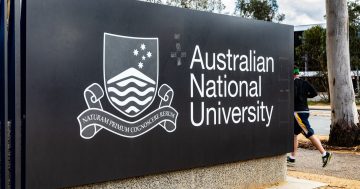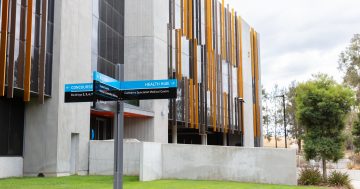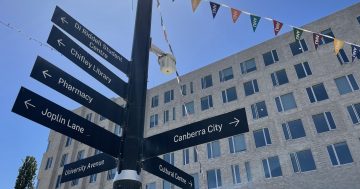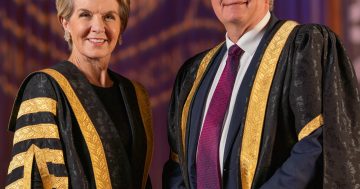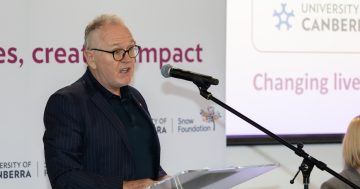
“Our students are really distressed about not having person-to-person, small group teaching,” says ANU vice-chancellor Professor Brian Schmidt. Photo: Supplied.
The Australian National University is facing a $225 million shortfall in funds, potential staff cuts and deferral of courses for students as it reveals the depth of the effects of the COVID-19 pandemic.
The enrolment of new students is also being restricted; however, ANU Vice-Chancellor Professor Brian Schmidt said yesterday (27 May) that while no job losses are planned, some hard decisions will need to be made.
“There is no quick or easy fix,” Professor Schmidt told the ANU’s staff and students.
“Fortunately, we started 2020 in a strong financial position, but we now know that this year we’ll earn around $150 million less than we expected and we’ll spend about $75 million more than we planned due to the crises we have endured this year. The $225 million gap that creates is what we now need to address.”
Professor Schmidt and ANU Chief Operating Officer Paul Duldig briefed the media about the impending financial crisis that looms for the university and conceded that “no stone will be left unturned” to address the shortfall.
Professor Schmidt said the summer’s bushfires, the hailstorm and coronavirus had all contributed to the increased running costs at the ANU.
“The COVID-19 pandemic, in particular, has caused a big hit to our revenue – a downturn that we will feel not just this year, but in the years to come,” he said.
Capital projects have been deferred, travel has been significantly reduced, while $1 million in borrowed money from the student union has already been spent. Professor Schmidt said staff and alumni have made generous donations where possible. The university will also look to philanthropists to contribute to research projects. Early retirement of long-standing staff and voluntary redundancies will be encouraged.
“But even after all of this, we need to find an additional $100 million in savings this year. We also need to be able to operate with at least $150 million less money next year and we can expect ongoing savings of this magnitude are likely in 2022 and beyond,” he said.
Professor Schmidt said staff salaries are the university’s biggest expense. ANU’s senior management group will take a 10 per cent pay cut from the second half of this year. Professor Schmidt will take a 20 per cent pay cut. Further pay cuts have not been ruled out.
ANU staff were scheduled to receive a pay rise in July.
Professor Schmidt said the National Tertiary Education Union’s (NTEU) recent rejection of a 15 per cent pay cut for one year to guarantee no job losses was “draconian”.
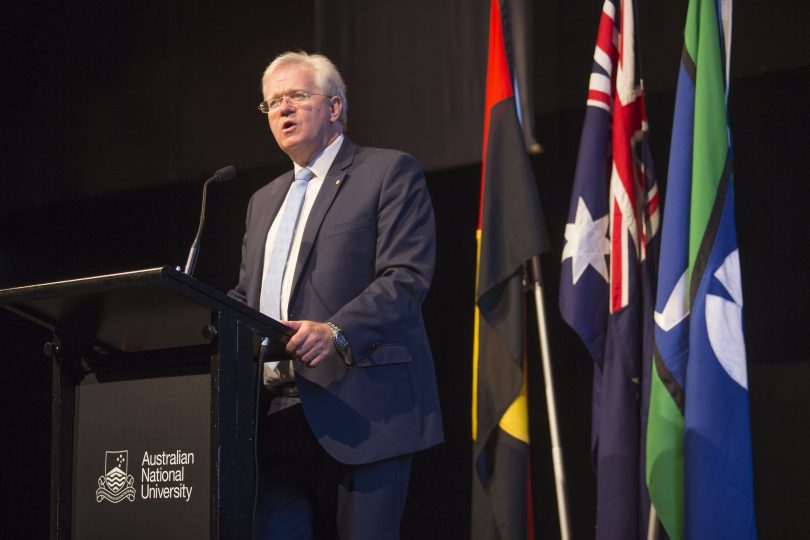
ANU’s senior management group will take a 10 per cent pay cut from the second half of this year. Professor Schmidt (pictured) will take a 20 per cent pay cut. Photo: File.
The NTEU will hold a socially distanced protest outside the electorate office of Treasurer Josh Frydenberg today to demand an urgent support package for universities.
“Universities are facing a $4.5 billion dollar revenue shortfall this year and even more next year, threatening 30,000 jobs,” NTEU National President Dr Alison Barnes said.
“We have proposed a jobs protection framework that could save 12,000 jobs, but that’s still a lot of university workers who could find themselves joining Centrelink queues.
“Here is the perfect opportunity for the Government to step up and protect those jobs and keep the university sector operating efficiently.”
The NTEU added that “it would take a fraction of the $60 billion [JobKeeper] ‘windfall’ to save every university job in the country”.
He said there are no plans at this stage for staff to be stood down and the university is committed to maintaining casual and fixed-term teaching contracts. However, with reduced student numbers and the possibility of the reduction of some research activity, staffing will be matched to the work required.
“We will do everything we can to explore voluntary, rather than involuntary measures, and we are absolutely committed to ensuring ANU continues to deliver its mission and is prepared for the years ahead,” Professor Schmidt said.
While about 90 per cent of international students have continued their studies, they are doing so remotely and not on campus. Professor Schmidt said the loss of international students to the university and local economy will be felt for some time and heralds the future of face-to-face learning, which he says has changed forever as the ANU works to set a clear direction for this year by the start of semester two in July.
“Australia and the world will look to us and other universities to help provide a pathway for the future, whether it be the ideas that will shape our society or an education that will help our graduates to contribute and lead in the time ahead,” Professor Schmidt said.
“Our students are really distressed about not having person-to-person, small group teaching. That ability to interact with some of the most accomplished people in the world is missing and they are missing that.
“While there will be some institutions that will go entirely digital, blending digital with face-to-face learning is going to be really important as we move forward.”












